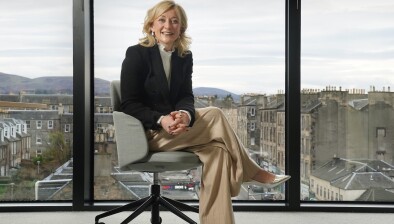Deloitte: New lockdowns edge Scottish consumer confidence to near-record lows

Gavin Hood
The final quarter of 2020 saw consumer confidence in Scotland fall by a further two percentage points, to -18%, as the country headed into the New Year under fresh lockdown restrictions, according to the latest Deloitte Consumer Tracker.
With the exception of personal finances, all other measures of confidence were below year-on-year comparisons, with ‘health and wellbeing’ and ‘children’s education and welfare’ categories reaching historic lows.
Deloitte’s analysis is based on a nationally representative sample of more than 3,000 UK consumers, (295 from Scotland) between 1st and 4th January 2021, after a Brexit deal had been reached, and as a third national lockdown was announced.
The emergence of a more virulent strain of COVID-19 saw Scottish confidence around health and wellbeing fall 11 percentage points in Q4 2020, the lowest level ever recorded at -39%. Coupled with school and nursery closures in the New Year, confidence in children’s education and welfare also reached a record low, falling six percentage points to -20%.
Across the UK, the extension of some major government and private sector income-support measures, such as the furlough scheme and payment holidays on loans, mortgages and credit cards, boosted confidence in personal finances, improving sentiment in the fourth quarter.
In Scotland overall sentiment on levels of household disposable income rose to -12%, showing consumers are slightly more positive than across the rest of the UK, where sentiment sits at -17%. In Scotland, this has improved by five percentage points compared to the same time last year, prior to the COVID-19 outbreak.
With many UK consumers working from home, free of commuting costs and unable to spend on holidays or socialising, 31% of respondents said their savings had increased in 2020 with Millennials leading the way (35%).
By contrast, 29% of consumers said their savings had decreased over the same period, with 30% of Gen-X and 30% of Baby Boomers each falling into this category.
Ian Stewart, chief economist at Deloitte, commented: “High levels of savings combined with confidence in household disposable income point to favourable conditions for supporting growth in consumer activity when the recovery comes. The easing of lockdown restrictions, coupled with vaccines being more widely rolled out and strong personal finances, should unleash pent-up demand to spend.”
Consumer confidence on the state of the economy was buoyed in the final quarter of the year by news of an agreed Brexit deal, as sentiment in the UK jumped nine percentage points from the previous quarter. However, the economic impact of ongoing COVID-19 restrictions has seen economic sentiment remain extremely negative, at -73%. Meanwhile, in Scotland, this is five percentage points lower, at -78% but a ten point increase on Q3.
Nevertheless, there are signs that financial support packages and the extension of furlough to the end of April have likely limited further unemployment, as job security sentiment in the UK remained flat from Q3, at -15%, and job opportunity and career sentiment rose by one percentage point, to -19%.
In Scotland sentiment was found to be slightly more negative for both job security and job opportunities and career progression, with both showing a drop of 2 percentage points from Q3 to -16% and -21% respectively.
Mr Stewart continued: “The deepest global downturn since the 1930s will leave a ‘hangover’ but, whilst other recessions have often resulted in the loss of skills and capacity, this time is different in many respects. Government initiatives, for instance, have significantly limited the damage to jobs and businesses. However, the outlook for growth in 2021 hinges on the continued battle between COVID-19 containment on the one side, and vaccination on the other.”
According to the research, in Scotland discretionary spending decreased by two percentage points in Q4, to -25%. Whilst remaining low, this was boosted primarily by the purchase of alcohol and tobacco, electronic equipment and, clothing and footwear.
With some consumers able to save more as a result of fewer spending opportunities, and disposable household incomes slightly improved on Q3, this could indicate recovery of the high street when non-essential retail reopens once more. However, CFOs have indicated that homeworking could rise five-fold by 2025. Combined with greater consumer interest in buying locally, the question for retailers is which behaviours will shift permanently after lockdown.
Ben Perkins, head of consumer research at Deloitte, added: “In Scotland, tighter restrictions over the Christmas period negatively impacted on spending across almost every leisure category in the final quarter of 2020. With few options available, consumers turned to in-house leisure, such as on-demand TV and at-home exercise classes, which saw a ten percentage point jump on the previous year.
“However, with social distancing restrictions in place, restaurants, pubs and cafés were, by contrast, hardest hit with year-on-year spend on eating and drinking out declining by -49 and -41 percentage points, respectively.”
Gavin Hood, advisory corporate finance partner at Deloitte in Scotland, commented: “In what should have been one of the busiest times of the year for the leisure, travel and hospitality sectors, most businesses had to endure tighter restrictions as a result of a new virus variant, forcing the vast majority of businesses to remain closed.”
Whilst UK consumers remain cautiously optimistic about the prospect of summer holidays, Scot’s seem less so, with confidence around both short and long holidays falling to -19% in Q4. This contrasts with UK consumers where there was a seven percentage point increase to -14% and -15% respectively, when compared to Q3. Recent tightening of travel and quarantine requirements are likely to impact spending intentions on travel over the next three months.






